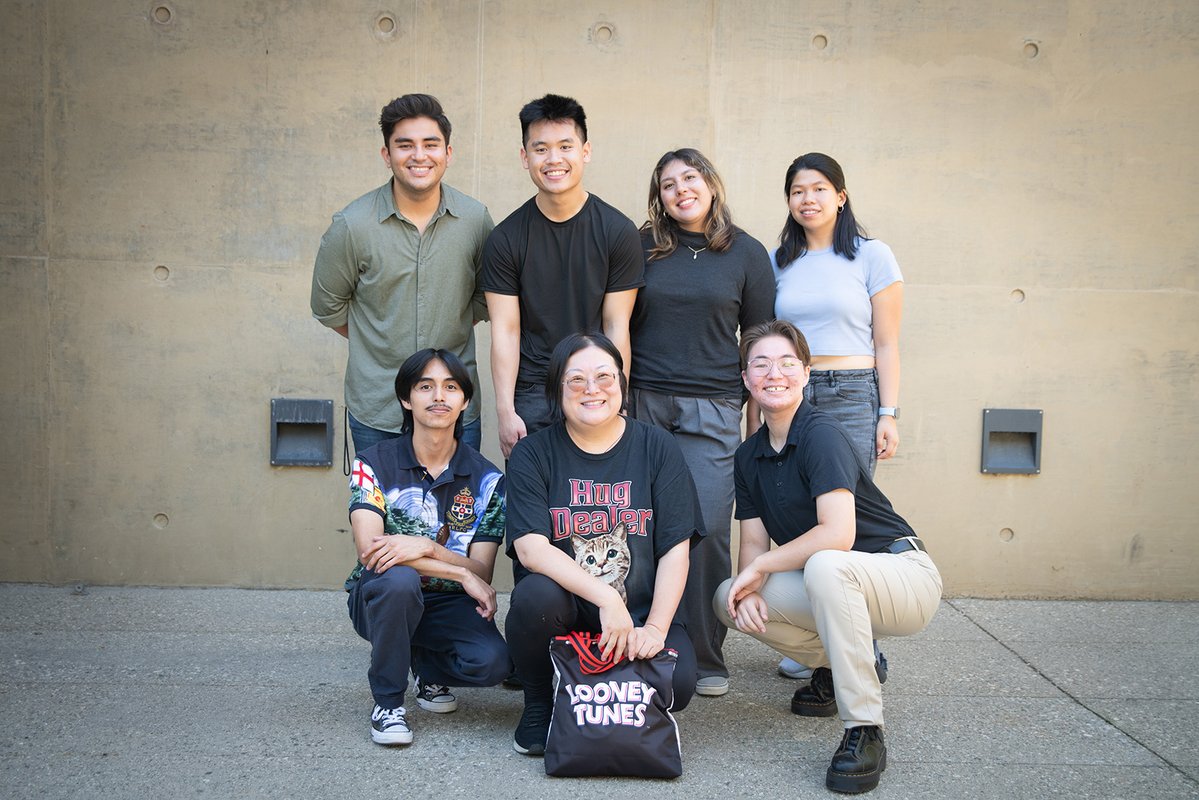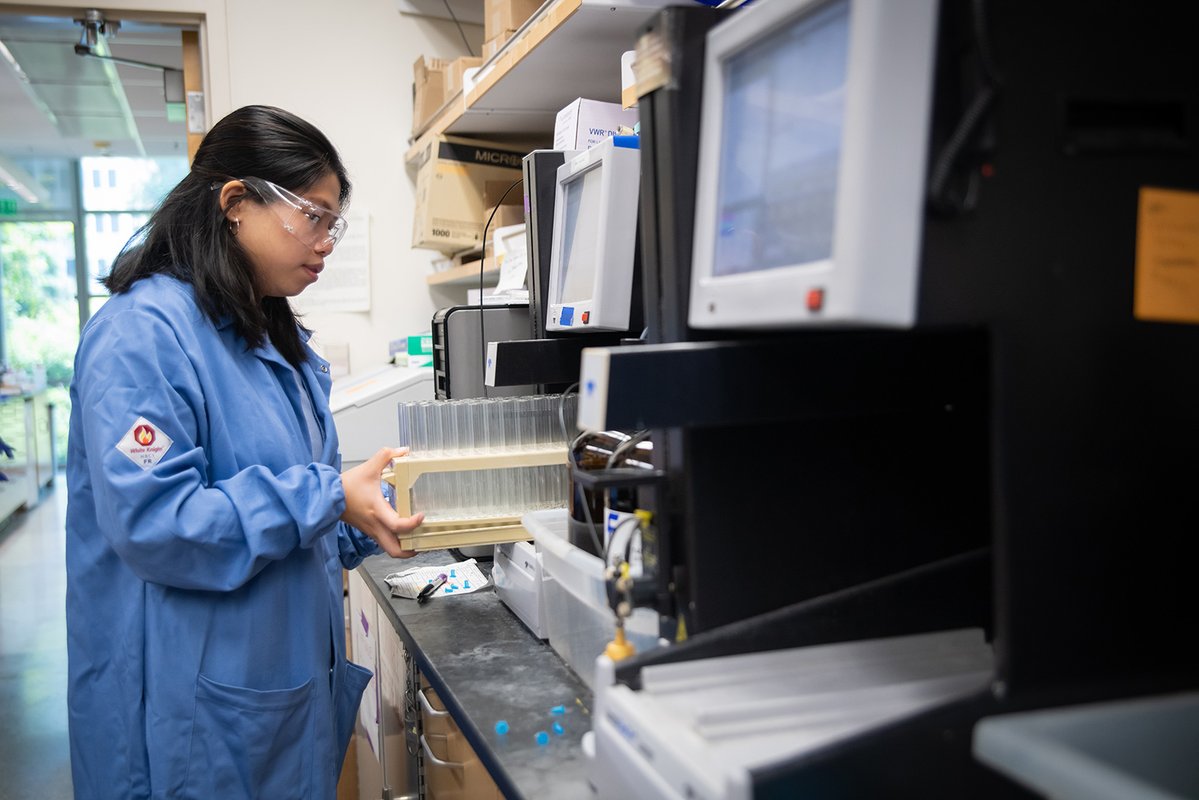"I never would have gone into the scientific field if not for people exposing me to it, inspiring me in it, and carrying me all the way through it." -David Cagan
David Cagan, a chemistry graduate student at Caltech and alumnus of Pasadena City College (PCC), says his path to Caltech was paved by mentors who introduced him to the beauty of science and vouched for him at every turn. Now, he is laying the foundation for the next generation with a program that formalizes those support systems: Rising Tide.
Conceived by Cagan and implemented in partnership with Caltech's Student-Faculty Programs (SFP) and Division of Chemistry and Chemical Engineering (CCE), Rising Tide is a chemistry research techniques training program for PCC students. Over five weeks in the summer, students complete research rotations in synthetic, analytical, and computational chemistry, while also developing professional skills and building relationships with scientific mentors.
Rising Tide aims to increase the participation of historically excluded students in STEM PhD programs. Cagan says he hopes the program can make research accessible to students who have the highest barriers to entry, especially first-generation and low-income students.
"Rising Tide is just one of many ways that David gives back to the larger scientific community," says Candace Rypisi, assistant vice provost and director of SFP. "He is an inspirational campus leader who is always looking for ways to make a difference. Rising Tide is a perfect addition to help bridge Caltech's outreach efforts with our undergraduate research programs."
The concept for Rising Tide came from Cagan's own experiences in research. After discovering an unexpected passion for chemistry as an art student, he began participating in scientific research at PCC, as a summer intern at Cal Poly Pomona, and at Cal State Los Angeles, where he ultimately transferred to earn his bachelor's degree in chemistry. During his final summer as an undergraduate, he completed a 10-week research program as a WAVE Fellow at Caltech.
Cagan says adjusting to Caltech research, even with years of prior lab experience, was a challenge. "Going from community college to Cal State LA felt like I was gaining resources, and then coming from Cal State LA to Caltech, I realized how little resources I had before. I felt very underprepared and kind of like a fish out of water."
That experience led him to rethink what a pipeline to equity in higher education could look like. Cagan says diversity and inclusion programs should consider existing equity disparities among the student populations they aim to recruit. For example, first-generation, low-income students do not have the privilege to participate in unpaid research internships for experience and may have to prioritize jobs and family commitments over schoolwork.
For those reasons, Rising Tide does not require participants to have previous research experience or straight A's. In fact, it favors students with no research experience, serving as an accessible introduction to research techniques and graduate education. Students are also paid a stipend throughout the program.
In summer 2023, six PCC students participated in the first Rising Tide program. They described the experience as transformative and eye-opening.
"During these five weeks, I learned and experienced much more than I could have dreamed of," said Seiji Sakamoto, a Rising Tide participant, in a post-program survey.
"The Rising Tide program opened a door of research opportunity for me," said participant Chaw Soe in the same survey. "I would not know what a PhD is if it were not for this program, as I do not know anyone who has a PhD or is currently pursuing one. Rising Tide was particularly helpful to me since I was able to make a lot of connections with people working in science and research."
In each research rotation, Rising Tide students worked directly with graduate student and postdoctoral mentors who taught them fundamental skills such as molecule synthesis, reaction analysis, and spectroscopy. The participants kept detailed lab notebooks, and at the end of each week they collaborated on a weekly recap, charting out and presenting their discoveries on a chalkboard.
In addition to solidifying their knowledge, the students formed meaningful relationships during the program.
"Our time at Caltech wasn't just time in a lab, reading, and attending meetings," Sakamoto said. "It was a community of people who were pushing us to succeed and motivate us to do our best no matter what path we decide to take. That is what made my time as part of the inaugural class of Rising Tide so special and valuable to me."
What's next for Rising Tide? In the short term, Cagan says he hopes the program can expand to eight weeks and incorporate a biochemistry rotation. Long term, "I dream that this program can become a permanent fixture on campus," he says, envisioning trainings in other fields in addition to chemistry. Cagan says a full endowment of the program would enable future development and expansion.
In its pilot year, Rising Tide was made possible with funding from Cagan's mentor, Caltech assistant professor of chemistry Ryan Hadt, as well as CCE's Diversity Equity and Inclusion Committee. Maria Manzanares, associate director of SFP, adds that the program's success is a testament to "the cultivation of relationships, both personal and professional, that have been nurtured by David, the SFP office staff, and the local community. These efforts are strengthened by the community cultural wealth in STEM communities."
"My favorite part about Rising Tide is helping students who don't think they can do something realize that they can," Cagan says.
"Coming from my background, I know what getting an education did for me. It took me from not knowing anything about myself to having the ability to interrogate the world around me—not just in science, but in many disciplines—and feel like I can make a place for myself here. Rising Tide is about giving students the confidence to do whatever it is they want to do and feel like they belong there, and it was meant for them."
Written by Julia Ehlert















